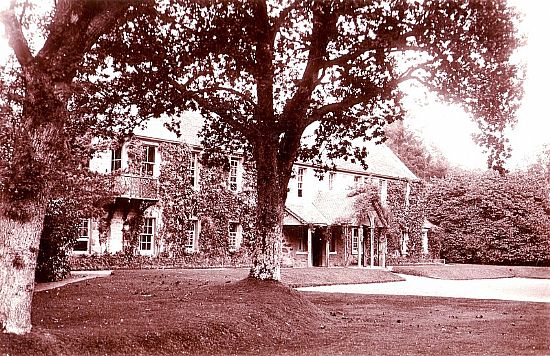13 to Dinner in Birnam Hall
Added on 01 April 2019

Sir John Everett Millais loved Perthshire.
It was here that he first met, then wooed and won Effie Gray away from her husband, John Ruskin. Causing quite a scandal. It was also his quiet corner, far from London Society, where he could pursue his three other loves: landscape painting, shooting, and fishing. The ten years when he leased Birnam Hall (formerly Dalpowie Lodge) at the western end of one of the Murthly Castle drives were some of his happiest. So reported his son, John Guille Millais, in the biography he cobbled together in 1899, Life and Letters (Methuen & Co).
There were always visitors and guests to Birnam Hall (no one living here escapes the visiting-friends-and-relatives-from-England experience, particularly in August). Young Johnny tells of a summer evening in 1885. On this occasion guests included Matthew Arnold ('On Dover Beach'), then one of England's foremost literary critics and poets, and three of John's young friends: Edgar Dawson, E. S____ and his sister G. (For reasons that will become clear John wanted to protect the identities of E. and G.) Along with family members and other guests already present, there was quite a party in the Hall that evening.
Miss G. S____ became very upset after they had all sat down to dinner, when she ran the numbers and realised they were 13 in all. She claimed a distressing experience following a previous occasion when that unlucky number was ignored. Millais couldn't humour her out of this superstition and even offered that young Johnny, as the only son at home, would go and dine on his own in the drawing-room. G. continued to be anxious saying, 'I fear some calamity will happen'.
Arnold laughingly said, 'Whoever leaves the table first will die within the year, so with the permission of the ladies, we will cheat the Fates for once. I and these strong lads (pointing to Edgar Dawson and E. S___) will all rise together, and I think our united constitutions will be able to withstand the assault of the Reaper.'
With great relish Johnny reported the outcome. Six months after that dinner Arnold, thought to be in the prime of life, died suddenly of a heart attack. Then E. S___ was found dead in bed, with a revolver by his side. (There were rumours of an affair gone wrong.) Edgar Dawson was thought to be safe out in Australia. But he suddenly booked passage home on the Quetta, a steamer leaving Melbourne in late February. Which foundered off the coast of New Guinea with no survivors.
'The facts are exactly as I have stated them, and are only too well-known to many now living,' wrote Johnny in his father's biography.
What a story, eh. What utter pants . . .
The truth is Mathew Arnold lived for nearly three years after the Fateful Evening. Until, in April 1888, while running to catch a tram in Liverpool he succumbed to the heart attack that had been threatening since he had retired on health grounds years before. From the 'drudgery' of being an inspector of schools. And the Quetta didn't sink until 1890. Off North Queensland, well short of the mysteriously exotic New Guinea. Although one of Queensland's worst maritime losses, most of the passengers survived.
Most . . . but unfortunately, not Edgar.
The facts were too well known to some, uncomfortably so for John. No one broke ranks to diss the story, however. Until, that is, Mr T. P. O'Connor chose to highlight it in his London weekly, Mostly About People, as evidence of the fatal truth underlying some superstitions. Which was too much for some Rationalists, prompting a letter to the Spectator pointing up the faulty timeline, and blowing a big hole in the 'die within the year' curse.
But why, in a book dedicated to the loving memory of your parents, tell such a whopper?